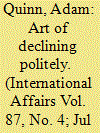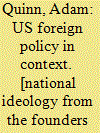|
|
|
Sort Order |
|
|
|
Items / Page
|
|
|
|
|
|
|
| Srl | Item |
| 1 |
ID:
105713


|
|
|
|
|
| Publication |
2011.
|
| Summary/Abstract |
Predictions of 'American decline' have come and gone before, apparently in cycles, leading some to regard it as a cultural trope stemming from domestic insecurities rather than a serious prospect. There is reason to believe, however, that this time is different. Fundamental erosion of the United States' decades-long primacy may finally be at hand, and wise analysis should resist the temptations of contrarianism or denial. Critics of 'declinism' have offered important caveats with which we should qualify any overly simplistic or deterministic portrait of America's trajectory from hegemon to lesser status. This article gives such qualifications due weight while nevertheless seeking to steer our gaze back towards the core truth at the heart of the declinist thesis. That is: unless something very significant changes to jolt the course of events onto a different track, the relative power of the United States-measured in terms of its advantage over others in economic and military capacity-will be shrinking significantly over the decades to come. Happily, the nation's current president seems to have a disposition well fitted to leading the nation into the opening stages of an era of relative decline. President Obama has made headlines in recent months for his boldness in orchestrating the killing of Osama bin Laden. A fuller survey of his foreign policy, however, reveals that its most signal feature has been prudence and circumspection regarding American power and its exercise. Major divergence between the ends pursued and the capacities available for their pursuit is one of the cardinal sins giving rise to strategic failure. It is thus fortunate for the United States that it should have a president who, even if he may not be inclined to cast it in such words himself, seems disposed not to 'rage against the dying of the light' of American primacy, but to practice the admirable art of declining politely.
|
|
|
|
|
|
|
|
|
|
|
|
|
|
|
|
| 2 |
ID:
081988


|
|
|
|
|
| Publication |
2008.
|
| Summary/Abstract |
The Bush National Security Strategy, even as it calls for "a balance of power that favors freedom," in truth rejects a balance of power approach to international order. It foresees instead the cooperation of all Great Powers under American leadership in furtherance of a common agenda imagined to be founded in universal values. Such rejection of a genuine "balance of power" approach represents a coherent evolution from America's long tradition of foreign policy thought. Emerging from its founding tradition of separation, U.S. strategic thought was influenced both by Theodore Roosevelt's advocacy of military strength in the service of good and Woodrow Wilson's ideological conviction that American engagement in the world could be made conditional on the pursuit of global reform in line with an idealized conception of American values and practices. The conviction that this notional "deal" is still valid provides this administration's ideological bedrock. The Bush worldview should not be seen as a radically new phenomenon, but as a logical outgrowth from the American foreign policy tradition.
|
|
|
|
|
|
|
|
|
|
|
|
|
|
|
|
| 3 |
ID:
163251


|
|
|
|
|
| Summary/Abstract |
This article argues that when actors engage in controversial new security practices, it is misconceived to view secrecy as an opposed, counterproductive alternative to the pursuit of legitimation. Rather, we propose, deployment of “quasi-secrecy”—a combination of official secrecy with leaks, selective disclosure, and de facto public awareness—can be an effective strategy for achieving normalization and legitimation while containing the risks entailed by disclosure. We support this claim via a detailed case study of US targeted killing. First, we establish the existence of an American norm against targeted killing during the period 1976–2001. We then detail the process by which an innovation in practice was secretly approved, implemented, became known, and was gradually, partially officially acknowledged. We argue that even if quasi-secrecy was not in this instance a coherently-conceived and deliberately pursued strategy from start to finish, the case provides proof of concept for its potential to be deployed as such.
|
|
|
|
|
|
|
|
|
|
|
|
|
|
|
|
| 4 |
ID:
098006


|
|
|
|
|
| Publication |
London, Routledge, 2010.
|
| Description |
ix, 218p.
|
| Series |
Routledge studies in US foreign policy
|
| Standard Number |
9780203867679, hbk
|
|
|
|
|
|
|
|
|
|
|
|
Copies: C:1/I:0,R:0,Q:0
Circulation
| Accession# | Call# | Current Location | Status | Policy | Location |
| 055126 | 327.73/QUI 055126 | Main | On Shelf | General | |
|
|
|
|
|
|
|
|
|